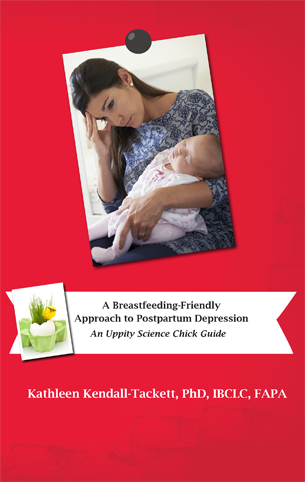May 27, 2015
Book Review: "A Breastfeeding-Friendly Approach to Postpartum Depression: A Resource Guide for Health Care Providers"
By: Sharon Muza, BS, LCCE, FACCE, CD/BDT(DONA), CLE | 0 Comments
By Cynthia Good Mojab, MS, LMHCA, IBCLC, RLC, CATSM
Kathleen Kendall-Tackett, Ph.D, author, IBCLC, researcher, internationally acclaimed speaker and occasional contributor to our blog, has written a new book - "A Breastfeeding-Friendly Approach to Postpartum Depression: A Resource Guide for Health Care Providers," that tries to lay to rest the myth that receiving help for a postpartum mood disorder and breastfeeding are not compatible. I asked Cynthia Good Mojab to share her expert review of the book to commemorate the end of Perinatal Mood Disorders Awareness Month. Cynthia is the perfect person for this task as she wears the hat of both a lactation consultant and a clinical counselor. As birth professionals who work with families throughout the childbearing year, we have a sincere responsibility to provide information and screening resources so that families can be evaluated and directed to receive help that continues to support the breastfeeding dyad if breastfeeding is the parent's desire. Read Cynthia's review and consider what you can do to increase awareness of perinatal mood disorders and offer your clients and students the best evidence based information available about how treatment options and breastfeeding are not mutually exclusive. - Sharon Muza, Community Manager, Science & Sensibility
Globally, the prevalence of postpartum depression is as high as 82.1% when measured using self-report questionnaires and as high as 26.3% when measured using structured clinical interviews (Norhayati, Nik Hazlina, Asrenee, & Wan Emilin, 2014). These high rates mean that a significant proportion of families navigate breastfeeding in the context of postpartum depression.
As a perinatal mental health care provider and an IBCLC, I am frequently contacted by parents who found me after having been unable to access breastfeeding-compatible mental health care for postpartum depression (Good Mojab, 2014). They report feeling as though they are caught between a rock and a hard place: they've been diagnosed with postpartum depression and have been told by their primary care provider and/or their mental health care provider that they must wean in order to treat their depression. Sometimes they are even told that breastfeeding is causing their depression. Not only is that not true, but the relationship between infant feeding and postpartum depression is actually quite complex (Nonacs, 2014). While breastfeeding problems increase the risk of postpartum depression, breastfeeding itself is protective (Kendall-Tacket, n.d.). And research shows that infant-feeding intentions matter: breastfeeding mothers who are unable to accomplish their breastfeeding goals are two-and-a-half times more likely to develop postpartum depression (Borra et al., 2015). These research findings match what I see in my private practice: the partial or complete loss of a parent's desired experience of breastfeeding can precipitate deep grief and worsen or precede the onset of postpartum depression.
Fortunately, there are many breastfeeding-compatible treatments for postpartum depression which health care providers and mental health care providers can use to effectively treat the vast majority of their clients. Dr. Kathleen Kendall-Tackett's new book, "A Breastfeeding-Friendly Approach to Postpartum Depression: A Resource Guide for Health Care Providers," presents an up-to-date overview of the related research in an outline format that is quick and easy to read. She presents a compelling case for ensuring that families coping with breastfeeding problems receive additional lactation support and that breastfeeding parents coping with postpartum depression have access to treatment that is compatible with the continuation of breastfeeding.
In the first chapter, Kendall-Tackett introduces the rationale for screening for, referring for, and treating postpartum depression: postpartum depression is common in new parents and untreated postpartum depression has significant, immediate, and long-term negative consequences for both parent and child. She then presents research showing that breastfeeding does not cause depression (as some health care providers falsely believe); rather, breastfeeding serves to protect the dyad from the deleterious consequences of postpartum depression via its dampening of the stress response and via its facilitation of ongoing engagement between parent and baby. (When we shift our culturally based reference frame in recognition that breastfeeding is the biological norm for humans, we can see that this research also shows that formula feeding increases the risk of deleterious consequences from postpartum depression through increasing the stress response and potentially lessening ongoing engagement between parent and baby.) The substantial evidence base for why the effective treatment of postpartum depression is so critical - briefly introduced in chapter 1 - is presented in more detail in chapter 3. Psychological disorders that often co-occur with postpartum depression, such as posttraumatic stress disorder, bipolar disorder, eating disorders, and obsessive-compulsive disorder, are then described. Chapter 5 reviews the complex causes of postpartum depression, including inflammation, fatigue and sleep disturbance, pain, traumatic birth experiences, infant characteristics such as illness and prematurity, and maternal characteristics, life history, psychiatric history, and social context.
Chapter 6 emphasizes the importance of screening for postpartum depression. Kendall-Tackett wisely advocates that validated screening tools be used (rather than relying merely on casual observation) and that screening occur in a variety of care settings - prenatal, hospital, home, and pediatric office visits. The recommendation for prenatal screening is very important. Depression during pregnancy is common (11% to 23% of pregnant women experience depression), is a risk factor for adverse reproductive outcomes such as preterm delivery, and is among the strongest predictors of postpartum depression (Gaynes, et al., 2005; Yonkers, et al., 2009; Norhayati, Nik Hazlina, Asrenee, & Wan Emilin, 2014). Kendall-Tackett describes three reliable screening tools - two of which (the Patient Health Questionnaire-2 and the Edinburgh Postnatal Depression Scale) are in the public domain. This excellent chapter would be improved further with information about how to implement perinatal mental health screening in various settings, including the need to build a breastfeeding-friendly referral network prior to initiating screening and the need to develop or obtain materials (e.g., brochures, handouts, posters, resource lists, referral lists) that provide anticipatory guidance and help parents more easily access information, support, and treatment for postpartum depression (Good Mojab, 2015).
In chapter 7, Kendall-Tackett presents the development of a breastfeeding-friendly treatment plan as being grounded in the facilitation of informed decision making - something perinatal care providers are ethically obligated to do. Informed decision making requires that parents be offered evidence-based information that will allow them to weigh the risks and benefits of a variety of treatment options. This final chapter presents such information in the form of a succinct review of the available research on treatments that have been shown to be effective in treating depression, including: 1) "alternative" treatments (i.e., long-chain omega-3 fatty acids, exercise, S-Adenosyl-L-Methionine, and bright light therapy), 2) psychotherapeutic treatments (i.e., cognitive behavioral therapy and interpersonal therapy), 3) herbal medications (i.e., St. John's Wort); and 4) anti-depressant medications. The reader is referred to the Infant Risk Center for up-to-date information about the use of particular anti-depressant medications during breastfeeding. Additionally, Medications and Mothers' Milk: A Manual of Lactational Pharmacology is listed among the references. The LactMed app, though not mentioned in the book, is another useful resource for facilitating informed decision making regarding the use of drugs and supplements during breastfeeding.
The appendices are helpful for readers who have not yet begun to screen for perinatal depression and are looking for appropriate screening tools. Included are the Postpartum Depression Predictors Inventory - which can be used to identify risk factors for postpartum depression - and the Edinburgh Postnatal Depression Scale - which is well-validated as a screening tool for perinatal depression in mothers, in many cultures and languages, and in fathers. (A gender/prenatal/postpartum inclusive version of the EPDS is available here.) Because postpartum depression often includes symptoms of anxiety and/or co-occurs with an anxiety disorder, the appendices would have been improved by including the well-validated Generalized Anxiety Disorder 7-item (GAD-7) Scale, which is also in the public domain.
Scattered throughout the book are links to video clips that provide information on topics such as how breastfeeding protects maternal mental health and how breastfeeding ameliorates the negative effects of sexual assault. Readers with an auditory learning style will especially appreciate this access to online interviews and mini-presentations. Unfortunately, the dark gray links on a light gray background can sometimes be hard to read, leaving the reader to wonder "is that character a capital I, a lowercase L, or a numeric 1?" But, the video resources are worth the trial and error needed to open a couple of the links. Those with access to a smartphone with a QR code reader or barcode scanner can simply scan the code for each video clip to open the links, which greatly simplifies the process.
While the title of the book, "A Breastfeeding-Friendly Approach to Postpartum Depression," is gender neutral, readers should know that the book is focused on cisgender mothers and uses cisnormative language. Certainly, there is a dearth of research on transgender and gender non-conforming parents which makes it difficult to write an evidence-based book addressing their needs in the context of breastfeeding/chestfeeding and postpartum depression. Nonetheless, we can infer that the high rate of clinical depression (44.1%) among transgender individualsmeans that transgender parents are at high risk for postpartum depression. And, the fact that transgender individuals experience "gender insensitivity, displays of discomfort, denied services, substandard care, verbal abuse, and forced care" in health care settings (Bockting, et al., 2013) means that transgender parents are also at high risk of being unable to access effective mental health care, much less breastfeeding/chestfeeding-compatible mental health care. Perinatal care providers need to be aware of these higher risks and learn how to bring their services into compliance with the Standards of Care for the Health of Transsexual, Transgender, and Gender-Nonconforming People (Bockting, et al., 2011). The lactation-friendly treatment options for postpartum depression that are reviewed in the book are likely to also be effective for transgender and gender non-conforming parents who breastfeed, chestfeed, or feed their expressed milk to their babies. The effective treatment of breastfeeding/chestfeeding parents with postpartum depression will also need to include responding to whether and how they are experiencing gender dysphoria during lactation.
Although written for health care providers, "A Breastfeeding-Friendly Approach to Postpartum Depression" will also be useful for childbirth educators, doulas, lay supporters, lactation specialists, and perinatal mental health care providers as they strive to do their part to offer families evidence-based anticipatory guidance about postpartum depression and its treatment options, advocate for more lactation support for families coping with breastfeeding difficulties, screen for postpartum depression, refer to and effectively collaborate with other breastfeeding-friendly perinatal care providers, and provide services that avoid iatrogenically increasing the risk of negative health, developmental, and mental health consequences for parents and babies through the unnecessary undermining of breastfeeding. The more widely Dr. Kendall-Tackett's powerful little book is read and applied in practice, the more breastfeeding families will have access to breastfeeding-compatible treatment that truly meets their needs in the context of postpartum depression.
References
Bockting, W., Miner, M., Swinburne, R., Hamilton, A., and Coleman, E. (2013). Stigma, mental health, and resilience in an online sample of the US transgender population. Am J Public Health, 103:943-951. Accessed: May 23, 2015. Url: http://www.ncbi.nlm.nih.gov/pmc/articles/PMC3698807/pdf/AJPH.2013.301241.pdf
Borra, C., Iacovou, M., and Sevilla, A. (2015). New evidence on breastfeeding and postpartum depression: The importance of understanding women's intentions. Maternal and Child Health Journal, 19:897-907. Url: http://www.ncbi.nlm.nih.gov/pmc/articles/PMC4353856/pdf/10995_2014_Article_1591.pdf
Coleman, E., Bockting, W., Botzer, M., et al. (2011). Standards of care for the health of transsexual, transgender, and gender-nonconforming people, version 7. International Journal of Transgenderism, 13:165-232. Accessed May 23, 2015. Url: http://www.wpath.org/uploaded_files/140/files/IJT%20soc,%20v7.pdf
Gaynes, B., Gavin, N., Meltzer-Brody, S., Lohr, K., Swinson, T., Gartlehner, G., Brody, S., Miller, W., et al. (2005). Perinatal depression: Prevalence, screening accuracy and screening outcomes;Evid Rep Technol Assess (Summ). 119:1"8.
Good Mojab, C. (2014). Mental Health Care for Postpartum Depression During Breastfeeding. Lynnwood, WA: LifeCircle Counseling and Consulting, LLC. Accessed May 23, 2015. Url: http://lifecirclecc.com/yahoo_site_admin/assets/docs/MentalHealthCarePPDBfd2014.pdf
Good Mojab, C. (2015). The Basics of Perinatal Screening. Accessed May 23, 2015. Url: http://www.lifecirclecc.com/professionals/perinatal_screening
Hale, T. and Rowe, H. (2014). Medications and Mothers' Milk: A Manual of Lactational Pharmacology. Amarillo, TX: Hale Publishing.Kendall-Tackett, K. (n.d). Why Breastfeeding and Omega-3s Help Prevent Depression in Pregnant and Postpartum Women. Accessed May 23, 2015. Url: http://www.uppitysciencechick.com/why_bfand_omega_3s.pdf
Kosenko, K., Rintamaki, L., Raney, S., and Maness, K. (2013). Transgender patient perceptions of stigma in health care contexts. Med Care, 51(9):819-22.
Nonacs, R. (2014). Breastfeeding and Postpartum Depression: Further Insights Into a Complicated Relationship. Massachusetts General Hospital Center for Women's Mental Health. Accessed: May 23, 2015. Url: http://womensmentalhealth.org/posts/breastfeeding-postpartum-depression-insights-complicated-relationship/
Norhayati, M., Nik Hazlina, N., Asrenee, A., & Wan Emilin, W. (2014). Magnitude and risk factors for postpartum symptoms: A literature review. Journal of Affective Disorders, 175C, 34-52.
Yonkers, K. Wisner, K., Stewart, D. Oberlander, T., Dell, D., Stotland, N., Ramin, S., et al. (2009). The management of depression during pregnancy: A report from the American Psychiatric Association and the American College of Obstetricians and Gynecologists. Obstet Gynecol. 114(3):703"713. Accessed: May 28, 2015. Url: http://www.ncbi.nlm.nih.gov/pmc/articles/PMC3094693/pdf/nihms293837.pdf
About Cynthia Good Mojab
 Cynthia Good Mojab, MS Clinical Psychology, is a Clinical Counselor, International Board Certified Lactation Consultant, author, award-winning researcher, and internationally recognized speaker. She is the Director of LifeCircle Counseling and Consulting, LLC where she specializes in providing perinatal mental health care, including breastfeeding-compatible treatment for postpartum depression. Cynthia is Certified in Acute Traumatic Stress Management and is a member of the American Academy of Experts in Traumatic Stress and the National Center for Crisis Management. Her areas of focus include perinatal loss, grief, depression, anxiety, and trauma; lactational psychology; cultural competence; and social justice. She has authored, contributed to, and provided editorial review of numerous publications. Cynthia can be reached through her website.
Cynthia Good Mojab, MS Clinical Psychology, is a Clinical Counselor, International Board Certified Lactation Consultant, author, award-winning researcher, and internationally recognized speaker. She is the Director of LifeCircle Counseling and Consulting, LLC where she specializes in providing perinatal mental health care, including breastfeeding-compatible treatment for postpartum depression. Cynthia is Certified in Acute Traumatic Stress Management and is a member of the American Academy of Experts in Traumatic Stress and the National Center for Crisis Management. Her areas of focus include perinatal loss, grief, depression, anxiety, and trauma; lactational psychology; cultural competence; and social justice. She has authored, contributed to, and provided editorial review of numerous publications. Cynthia can be reached through her website.
Tags
Postpartum depression Breastfeeding Childbirth education Postpartum Maternal Mental Health Book Review Professional Resources Kathleen Kendall-Tackett PPMAD Decision-Making Cynthia Good Mojab